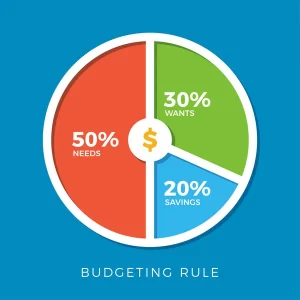Financial planning can seem overwhelming, but it doesn’t have to be. Crafting a budget that you can actually stick to is key to achieving your financial goals and having peace of mind. In this post, we’ll walk through the steps of creating a budget that fits your lifestyle and provides you with financial stability. We’ll discuss strategies to ensure that you stay on track with your budget and how to identify areas where you can adjust your spending for long-term success.
Why You Need a Budget
Managing your finances can feel like an uphill battle, but having a budget is a game-changer. Without a budget, you may find yourself wondering where your money went at the end of each month. A budget gives you control and clarity over your spending habits, helping you make intentional decisions about your money. It allows you to see where your hard-earned dollars are going and enables you to prioritize your financial goals. By having a budget in place, you can start saving for that dream vacation, paying off debt, or investing for your future. Budgeting is not about restriction; it’s about empowerment and peace of mind. So, why do you need a budget? Because it puts you in the driver’s seat of your financial journey.
The Key Components of a Successful Budget
A successful budget is built on key components that help you manage your finances effectively. The first component is income, which includes all the money you earn from your job, side hustles, or investments. Understanding your income is crucial for creating a budget that aligns with your financial goals. The second component is expenses, which encompass all the money you spend on bills, groceries, entertainment, and other necessities. Tracking and categorizing your expenses is essential for identifying areas where you can cut back or adjust your spending. Another important component is savings, which involves setting aside a portion of your income for emergencies, future goals, or retirement. Lastly, a successful budget incorporates financial goals, such as paying off debt or saving for a down payment. By focusing on these key components, you can create a budget that sets you up for financial success.
Identifying Your Financial Goals
Identifying your financial goals is a crucial step in creating a budget that truly works for you. Take some time to reflect on what you want to achieve with your money. Do you dream of owning a home, starting your own business, or traveling the world? Maybe you want to save for your children’s education or retire comfortably. Whatever your aspirations may be, clearly defining your financial goals will give you a sense of purpose and motivation. It will help you prioritize your spending and make intentional decisions that align with your long-term objectives. So grab a pen and paper, or open a note-taking app, and jot down your financial goals. This simple act can have a profound impact on your budgeting journey.
Creating a Realistic Budget
Creating a realistic budget is essential for achieving financial success. It involves taking a hard look at your income and expenses and finding a balance that works for you. Start by gathering all the necessary financial information, including your monthly income and bills. Next, categorize your expenses into fixed costs (such as rent and utilities) and variable costs (such as groceries and entertainment). Be honest with yourself about your spending habits and identify areas where you can cut back or make adjustments. It’s important to set realistic goals and prioritize your financial needs. Remember, creating a budget is not about deprivation; it’s about finding a balance that allows you to live within your means while still reaching your financial goals. So be proactive, be honest, and create a budget that reflects your true financial situation.
Strategies for Sticking to Your Budget
Once you’ve created a budget, the next challenge is sticking to it. Here are some strategies to help you stay on track:
1. Set clear financial goals: Having specific goals in mind gives you something to work towards. Whether it’s paying off debt, saving for a down payment, or building an emergency fund, keeping your goals in focus can motivate you to stay on budget.
2. Track your spending: Regularly monitoring your expenses will give you a clear picture of where your money is going. Use a budgeting app or a simple spreadsheet to track your transactions and categorize your expenses. This will help you identify any areas where you may be overspending.
3. Use cash envelopes: This strategy involves allocating a set amount of cash for specific spending categories, such as groceries or entertainment. Once the envelope is empty, you know you’ve reached your limit for that category. It’s a visual reminder of your budget and can help prevent overspending.
4. Practice mindful spending: Before making a purchase, ask yourself if it aligns with your financial goals. Is it a need or a want? Taking a moment to consider your spending choices can help you make more intentional decisions and avoid impulse purchases.
5. Find accountability: Share your budgeting goals with a trusted friend or family member who can help hold you accountable. They can provide encouragement and support as you work towards your financial goals.
Remember, sticking to a budget requires discipline and consistency. Be patient with yourself, and if you slip up, don’t be too hard on yourself. Adjust your approach as needed and keep moving forward on your journey to financial stability.
How to Make Adjustments When Life Happens
Life is full of surprises, and sometimes those surprises can throw off even the most well-crafted budget. But don’t panic! Making adjustments when life happens is a normal part of the budgeting process. When unexpected expenses arise, such as car repairs or medical bills, it’s important to reevaluate your budget and make the necessary changes. Look for areas where you can temporarily cut back or reallocate funds to cover the unexpected costs. This might mean cutting back on entertainment expenses or postponing non-essential purchases. Remember, flexibility is key. Life happens, and being able to adapt and adjust your budget accordingly will help you stay on track with your financial goals in the long run. So, embrace the unexpected and make adjustments with confidence!
Tools and Apps to Help You Stay on Track
Nowadays, there are countless tools and apps available to help you stay on track with your budget and financial goals. These resources can make managing your finances easier and more convenient. One popular budgeting app is Mint, which allows you to link your accounts, track your spending, and set budgeting goals all in one place. Another option is You Need a Budget (YNAB), which emphasizes the importance of giving every dollar a job and provides personalized advice to help you achieve your financial goals. If you prefer a more hands-on approach, spreadsheets like Google Sheets or Excel can be a great way to track your income and expenses. Whatever your preferred method, finding a tool or app that suits your needs can be a game-changer in staying on top of your budget and achieving financial success.





